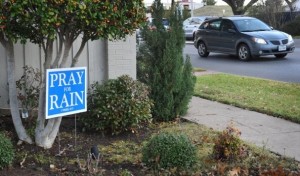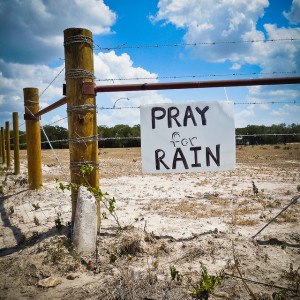 “Pray for Rain.” The sign in the front yard expressed the wishes of lots of folks in this part of the country. We need rain. Living without cell phones, gasoline, or electricity would be tough, but these are optional. Water is not. In that same yard, however, the sprinkler system was pumping about 60 gallons of water per minute, much of which, by the time I came walking by, was running down the street.
“Pray for Rain.” The sign in the front yard expressed the wishes of lots of folks in this part of the country. We need rain. Living without cell phones, gasoline, or electricity would be tough, but these are optional. Water is not. In that same yard, however, the sprinkler system was pumping about 60 gallons of water per minute, much of which, by the time I came walking by, was running down the street.
These signs appear to be a demonstration of faith, suggesting hope and faith that God will respond to the petition with the desired result: rain. However, prayers for rain also reveal a contradiction in our beliefs about such prayers.
The belief that a fervent prayer will produce the desired outcome is based on the assumption that God controls or manages events, including the weather, and can be persuaded to act in response to our prayers. The Bible appears to suggest as much. We ask God to alter the course of a disease when we don’t want someone to die. We ask God to change people’s driving habits in order to keep a loved one safe on a trip. We pray for wisdom at the beginning of a business meeting so that things will go the right way. That’s one side of faith, the self-serving side that expresses our wishes.
However, if we believe that God is responsible for the heavens and the earth, whether from the creationists’ perspective or the scientific perspective, and we believe that the created or existing order is as God ordained it to be, then a prayer for rain essentially is a questioning of God’s judgment and asking for a change in one what God declared “Good” in Genesis.
 Praying for rain seems to be saying, “Even though we trust that you are in charge of things, God, and we trust that you know what you are doing, we’re not too happy with how your system is working. It is causing us some distress, and we want you to modify things on our behalf. We’d like for you to make things better for us.” Ironically and tragically, in other parts of the country and the world, people are busy praying for the rains to subside before their houses are washed away.
Praying for rain seems to be saying, “Even though we trust that you are in charge of things, God, and we trust that you know what you are doing, we’re not too happy with how your system is working. It is causing us some distress, and we want you to modify things on our behalf. We’d like for you to make things better for us.” Ironically and tragically, in other parts of the country and the world, people are busy praying for the rains to subside before their houses are washed away.
Any God that can be convinced to change things on our behalf is a God unworthy of our worship. We should be wary of a God who will modify the national weather patterns for our benefit and convenience while so many others in the world have no clean water, no food, or are fleeing their country in fear with nothing more than what they can carry.
This is the same mentality displayed by a person who walks away from a serious accident saying, “God must have been with me,” the implication being that for the person who was injured or killed, God was nowhere to be found. Those of us who have lived long enough know that life and God don’t work that way.
It seems to me that a truly faithful stance would be to pray for wisdom and patience and resourcefulness in the midst of a situation we do not understand and is completely out of our control. If we believe God is in charge of things, our task should be to learn what we can from the draught, to discover what our role in the draught might be, to do everything in our power to be responsible stewards of the water we have, and to make a long-term plan in case the draught persists.
When interviewed by a reporter at last year’s community prayer meeting for rain, a local minister said something more truthful than he probably intended. “If we don’t get rain soon, we’ll have to change our lifestyle.”
Changing our lifestyle by becoming more conscious of and conservative in our use of water is completely within our control, and it seems the spiritually responsible thing to do. It is the very least we can do, literally.
So continue to pray, but while you are praying, take some actions that may make a difference while we wait for rain. Perhaps our signs should read, “While we pray for rain, let’s conserve water.”
2 Comments until now
Well written and you make good points. Allow me to put in a counter point to part of your article. If prayers can’t affect what God will do, and that makes God unworthy of our worship if He would change what He would do, then why did God change his mind in Genesis 18:26 after Abraham plead for the people in Sodom. God listened to Abraham’s plea and changed the plan. Utlimately Sodom was destroyed but God was willing to listen and make a change. Was God then not worthy of worship? Also, when we call on him to heal? The Roman centurion asked Jesus to heal his child. And Jesus did. That speaks to God doing something for us when asked. If God didn’t want relationship with us, then why did He make us? Part of relationship is asking that our needs be met. Certainly our brothers in Abilene deserve water. I know that the deeper question that is underlying is that so many are without food, water, medicine, etc… and that is a deeper question about our Faith.
Thanks for the comment, Jerry. Good points. This highlights the real mystery of prayer for me. We are encouraged to pray and we are given some indication that our prayers will be heeded. That means something about the nature of prayer, the nature of God, or both, but exactly what it means remains a mystery. I think that our prayers are most often not to talk God into something as much as to help us clarify what it is we really need, not so much to bend the will of God or the course of nature, but to help us align ourselves with what is happening. Once we are clear about that, we are in a better position to act accordingly, to promote change or to be at peace with what is not going to change.
Too often I fear we pray, and then we interpret what happens accordingly. If things turn out the way we prayed, then God answered our prayer. If they don’t, we assume God has another plan. In either case, our concept of prayer is still based on our wishes. I still believe that a God who can be talked into doing things our way is like a parent who indulges the child simply to keep the child from being upset. The bigger concern should be, “What do I believe would be best for my child now and in the long run?”
But mostly, I think it is a mystery and, as you said, it is within a relationship. A very important point.
Add your Comment!